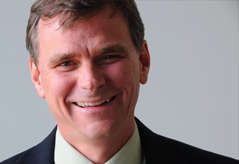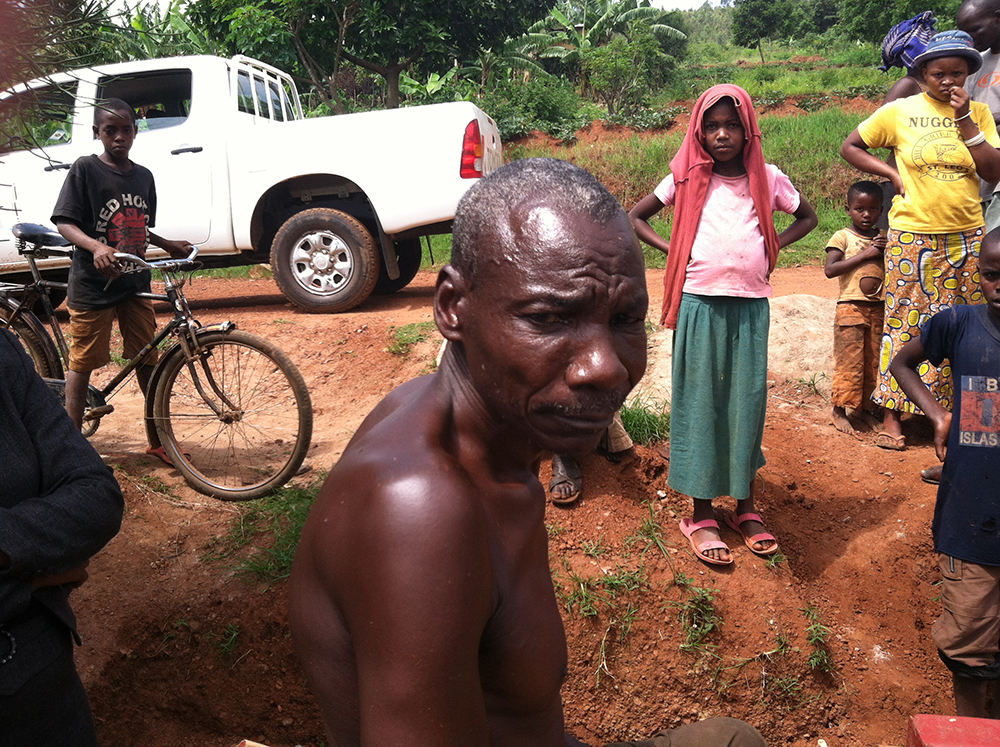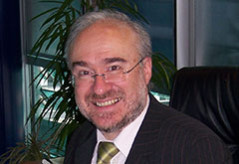Ned Breslin: An Inside Look at Water for People’s ‘Everyone Forever’ Initiative
For World Water Day 2013, Skoll World Forum and Circle of Blue asked four of the world’s leading water experts to weigh in. Here is what Ned Breslin, CEO of Water For People, had to say about what WASH nonprofits can do to reach full coverage.
Every organization focused on addressing the water and sanitation crisis has a mission statement that suggests they want to create a world where all people have access to water, or where no child dies from a water- or sanitation-related disease. And this is truly the type of world we all envision.
Unfortunately, we do not appear to be getting any closer to this envisioned world, despite our best efforts and billions of dollars of investments.
Recent water-sector data suggests that claims of considerable progress towards Millennium Development Goal (MDG) targets is sadly premature, as some like myself have suggested elsewhere. Sanitation remains off-track.
Water For People believes this inability to move the needle towards a world where everyone actually has water and sanitation services requires a fundamental rethink in WASH sector practice. We need to move away from transactional inputs that focus on short-term results — projects completed, counting beneficiaries like McDonalds, simplistically measuring loan repayments as a proxy for success — to a focus on long-term transformational outcomes. Does water flow so that families expect it every day? Do people use toilets all the time? Do large geographic areas (not communities) become independent of future water and sanitation aid?
In 2011, we launched Everyone Forever at the Skoll World Forum. We felt this was the perfect place to chart a new way forward — in an environment of change agents, unafraid of bold initiatives. We decided to hold ourselves accountable for lasting results — not immediate deliverables — and to model the world we all imagine at district level across the globe.
Districts transcend the narrowness of community support as they force staff to focus on hundreds (or thousands, in the case of India) of communities within a politically defined area. It forces staff to actually program to reach the poorest, most socially and politically marginalized in these districts, as would be necessary if we created a world where everyone had water and sanitation.
So how are we doing since launch? There are 5 core principles of Everyone Forever, and so let’s use the opportunity of World Water Day 2013 to provide a simple report back to the larger community working on these issues.
Principle 1: Every Family, Every School, Every Clinic
The first principle is that we will model full coverage in 30 districts worldwide by 2018. A bold goal to be sure, but success here would help us understand what it takes to create the foundations of that world where every person has water and sanitation. We can’t avoid the hard-to-reach, or the villages within districts who support the opposition, or the single mother who can’t afford to pay a tariff. We have to reach everyone.
This part of our program is gaining momentum based on success. A district run by the opposition party in Bolivia has achieved full coverage for water, as well, and this has spurred pro-government districts to match this success. And in India and Malawi, we have seen enormous strides forward in rural West Bengal and the city of Blantyre, with now a growing focus on improved services. Rwanda, too, is driving forward in the Rulindo District.
But what I like the most about all of this is the creative ways that districts are verifying results, highlighting who does not have access, and coming up with clever ways to target those hardest to reach, often the poorest. My favorite example is from Arani in Bolivia, where the district government has established a painted “water drop” symbol on all houses who have water, and thus targeting those who do not have water through advocacy and innovative financial mechanisms like loans for connections.
Principle 2: All Pay
We set this ambitious goal of full-district coverage and challenged staff to achieve this result, but we will not give them enough money to succeed. Every country in the world has money for water and sanitation investments, but few actually use what they have in any given year. Why? Because the system of transferring money from national Ministries of Finance to districts is messy at this stage. So Water For People helps district finance departments become good investments to Ministries of Finance. We try to get money flowing as government — not aid — is the main financial investor in water and sanitation. We also insist that communities pay up front, as well.
Our results here are generally positive, with some challenges. We are seeing some districts become lead investors in their water and sanitation solutions (as it should be) in places like Arani (Bolivia) and India. Likewise, we are seeing government and community finance combining to cover up to 50 percent of total costs in places like Rwanda and Honduras. But we are also seeing real challenges getting finances flowing in places like Guatemala and Malawi, which will require considerably more work and time.
What is clear is that districts and communities who pay insist this work is theirs, and they are right. There are no donor plaques on projects in these places, as the main donors and real owners of these investments are local.
Principle 3: Monitor, Monitor, Monitor
Water For People is passionate about monitoring, and this has proven to be the key to our constant efforts to improve. The FLOW monitoring system we initially developed is now in the capable hands of AKVO, with giant strides being taken to continue to reduce the costs of monitoring, increase accuracy, and quicken the speed of results being understood.
We will be launching a new reporting platform called Re-Imagining Reporting that will visually show where we work, what programmatic results we are seeing (good and bad), how our finances are allocated, and what we think is happening in the field. The platform combines storytelling and visualizations to make sense of our work. The information emerges from in-country reflection processes between partners and staff, focused on how we all can improve.
So monitoring, as promised, is happening, and we are seeing good progress — but real challenges are emerging also, as any good monitoring system should show.
Principle 4: Make Districts’ Aid Independent
The point of aid and philanthropy, in our case, is to catalyze change, in partnership with government and the local private sector, and to ultimately not be needed anymore. Otherwise, we have failed to achieve our intended results of a world where all people have access to water and sanitation without the constant need for more philanthropic dollars.
It is still early, but it is clear that this will remain a challenge that we enthusiastically embrace. We know from our monitoring results that tariffs on their own, in Latin America especially, will be insufficient to secure enough funds to replace systems over time. This has spurred new thinking in the development of micro-bonds at district levels, new forms of investments that safely grow local accounts, and new ideas on future government investments in water supply and sanitation. We also know that water resources are under great strain worldwide, necessitating a rethink on water resource management that will ensure water flows forever. We are seeing a new role for private operators and for mobile mechanics who can keep water flowing, and we are supporting emergent businesses in the sanitation space that are offering families new products, unique financing options, and on-going services.
We have a considerable amount of work ahead of us but are seeing interesting innovations emerge due to the clear focus on sustainability embedded in Everyone Forever.
Principle 5: Replicate and Scale
This one is particularly fascinating: we are finding that mayors brag about driving towards a big, audacious development solution like Everyone Forever, and that the increasing flow of money into their accounts is a huge selling point with other mayors. And so interest in Everyone Forever in the countries where we work is growing exponentially. We see real possibilities of this program influencing and guiding national initiatives along the same lines as Everyone Forever in countries as diverse as Honduras, Bolivia, Rwanda, and the state of Bihar in India. And we are gaining traction elsewhere in places like Uganda, Malawi, and Nicaragua.
To meet this demand, we are forming new alliances and partnerships. Water For People, the IRC in Holland, and the UK’s Water and Sanitation for the Urban Poor (WSUP) are starting to collaborate on each agency’s strengths. Water For People seems to be moving ahead well with district-based modeling but is not as well -quipped to support national processes as the IRC: they have considerable district-based experience, and so we are learning a great deal from each other. WSUP’s urban work stands alone, and this is a key part of successful national programs, as well.
Together, we are building on our strengths and filling gaps in each other’s programming to collectively support government efforts to transform their water and sanitation landscapes. Moreover, we are exploring a really interesting Everyone Forever program in Honduras under the auspices of the Millennium Water Alliance and their great members to help Honduras reach full coverage. And we are forging unique corporate partners with companies like Xylem, Green Mountain Coffee, and the Coca-Cola Company to fundamentally reshape the water and sanitation sector so that, one day, we can truly live in the world we envision.
Gaining momentum: we will keep you posted.
Originally published by Forbes on March 22, 2013 for World Water Day 2013. This series of articles, a partnership between Skoll World Forum and Circle of Blue, asked four of the world’s leading experts and innovators working on issues of water scarcity, security, and cooperation to weigh in to offer solutions and help better the understanding of key challenges and opportunities moving forward. This debate will also inform an upcoming session at this year’s Skoll World Forum in Oxford.
Read the other three articles in this series here:
- Michel Jarraud, chair of UN-Water and Secretary-General of the World Meteorological Organization: Water Can Be Fought Over or Shared, But Cooperation Brings More Benefits for All
- Sylvia Lee, leader of the water program at Skoll Global Threats Fund: Water as a Catalyst for Peace
- J. Carl Ganter, director and co-founder of Circle of Blue: The Biggest Story of Our Lifetime Is Water
Follow Ned Breslin on Twitter.
Circle of Blue provides relevant, reliable, and actionable on-the-ground information about the world’s resource crises.










Leave a Reply
Want to join the discussion?Feel free to contribute!